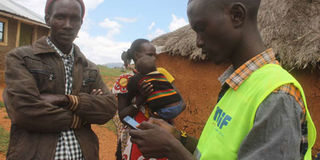NHIF maternity pay hits Sh1.5b

Mr James Kanu, a community health volunteer, enlists Francis Letiyalo and his family into the NHIF scheme using Mjali app in Laikipia County in March. PHOTO | FILE | NATION MEDIA GROUP
What you need to know:
- The number of patients being admitted in NHIF accredited facilities has also gone up, seeing claims settlement of Sh14 billion as compared to the previous Sh12 billion.
- Out-patient services also increased to Sh7.5 billion compared to the previous Sh5 billion.
The National Hospital Insurance Fund (NHIF) payouts for free maternity have crossed the Sh1.5 billion mark since it was launched in October 2016.
A scrutiny of the financial records indicates that the State insurer paid Sh1.5 billion in the 2017/2018 financial year, compared to Sh28 million paid in claims for 2016/2017, representing a 5,183 per cent increase.
According to a financial brief from NHIF obtained by the Sunday Nation, the money was used to settle bills of 395,918 mothers and 223,459 deliveries across the country.
Dubbed “Linda Mama – Boresha Jamii’, the free maternity was launched in October 2016, after the NHIF signed a Memorandum of Understanding with the government in February 2016.
“The sharp rise in the free maternity claims arose from the fact that the Fund fully took over the Linda Mama programme. Previously, it was largely under the Ministry of Health,” explained NHIF boss Geoffrey Mwangi, adding that services for registered mothers’ began thereafter on May 1, 2017.
The free maternity programme was transferred to the NHIF in 2016 to target pregnant mothers from low-income backgrounds.
ANTENATAL CHECKUPS
The nearly Sh4 billion programme guarantees expectant mothers at least four antenatal check-ups, delivery (normal and caesarean section) and post-natal check-ups, and immunisations for their children, with the cover paying about Sh6,000 per woman.
The 2017 statistical abstract indicates that there were approximately 1.5 million births in 2016, with about 875,101 children being delivered at a health facility.
The NHIF official records also show that expenditure on kidney transplants, minor and major surgeries and rehabilitation for drugs and substance abuse are also taking up the largest chunks of claim settlements.
For instance, the Fund notes that there was a 198 per cent increase in payments for kidney transplants from Sh22 million to Sh65 million. Surgery payouts equally shot up by 73 per cent from Sh2.1 billion to Sh3.6 billion and rehabilitation for drugs and substance abuse also consumed Sh54 million, up from Sh32 million.
CANCER TREATMENT
The number of patients being admitted in NHIF accredited facilities has also gone up, seeing claims settlement of Sh14 billion as compared to the previous Sh12 billion.
Out-patient services also increased to Sh7.5 billion compared to the previous Sh5 billion.
Cancer treatment took Sh1.4 billion from Sh1.2 billion, dental (managed scheme) consumed Sh559 million from Sh373 million, and specialised surgeries took Sh548 million from Sh274 million while rehabilitation for drugs and substance abuse gobbled up Sh54 million from Sh32 million.
“The Fund has over the last three years developed and rolled out a new benefit structure as a means towards expanding access to both the employed and self-employed sectors,” the report signed by the chief executive officer Geoffrey Mwangi notes.
Mr Mwangi added that the expanded benefits package currently offered have increased health care access for NHIF members and at the same time boosted the healthcare providers’ ability to offer more effective care to members.
PUBLIC EDUCATION
He added that the Fund has grown its principal membership from 6.8 million last financial year to Sh7.7 million.
“This growth is attributed to the various initiatives conducted which include recruitment of community health volunteers, partnerships with various counties, public education and local activations,” added Mr Mwangi.
Some 39 per cent of members are in private sector followed by the micro-insurance, which is at 38 per cent.
Private sector is made up of small businesses while micro-insurance consists of voluntary contributors.
Mr Mwangi said the Fund has been implementing various programmes aimed at enhancing social protection and inclusivity.






